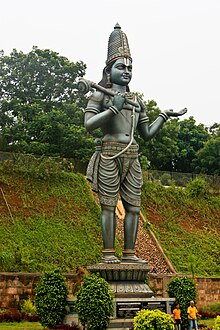Tallapaka Annamacharya Annamayya | |
|---|---|
 This statue is at Dwaraka Tirumala | |
| Background information | |
| Also known as | Annamayya, Pada Kavitha Pitaamahudu |
| Born | 22 May 1408 Tallapaka, Vijayanagara Empire (modern-day Andhra Pradesh, India) |
| Died | 4 April 1503 (aged 94) Tirumala, Vijayanagara Empire (modern-day Andhra Pradesh, India) |
| Genres | Carnatic music |
| Occupation(s) | Saint, poet, composer, writer |
| Instrument | Tambura |
Tallapaka Annamacharya (Telugu: తాళ్ళపాక అన్నమాచార్య, romanized: tāḷḷapāka annamācārya) (22 May 1408 – 4 April 1503), also popularly known as Annamayya, was a Telugu musician, composer, and a Hindu saint. He is the earliest known Indian musician to compose songs called samkirtanas. His devotional samkirtanas were in the praise of Venkateswara, a form of Vishnu. Annamayya is said to have composed as many as 32,000 samkirtanas (songs) in the praise of Venkateswara of which only about 12,000 are available today. He wrote the highest number of Kirtanas of all time in the praise of Lord Vishnu [1] The musical form of the kirtana songs that he composed, which are still popular among Carnatic music concert artists,[2] have strongly influenced the structure of Carnatic music compositions.[3] His compositions are classified as Adhyatma (spiritual) and Sringara (romantic). Annamacharya is remembered for his saintly life, as one of the greatest musicians and is honoured as a great devotee of Vishnu by devotees and saintly singers.[4] He was one of the first few who opposed the social stigma towards the untouchable castes in his era.
He is believed to have been the avatar of Nandaka, the sword of Vishnu. He is widely regarded as the "Andhra Pada kavitā Pitāmaha" (Grandfather of Telugu song-writing).[1]
- ^ a b "Life and Times of Sri Tallapaka Annamacharya". Svasa.org. Retrieved 20 June 2013.
- ^ Jackson (1999), p. 105.
- ^ Jackson (1999), p. 216.
- ^ Jackson (1999), p. 265.